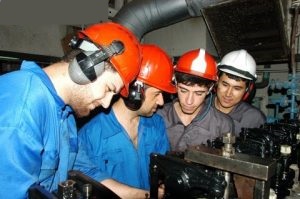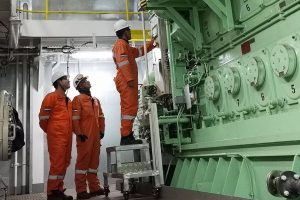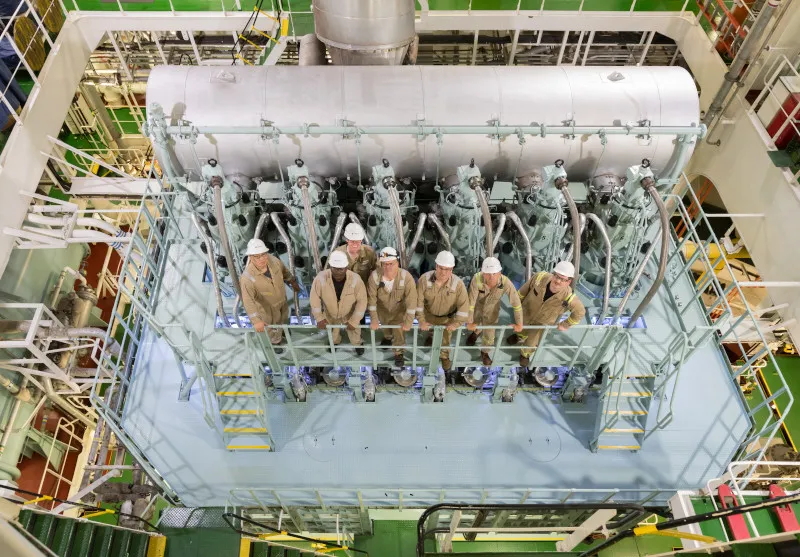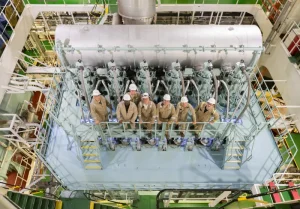Efficient engine room operations are central to successful ship management, ensuring safe voyages, optimal fuel consumption, and minimal environmental impact. Engine room tasks involve complex processes, from engine monitoring and fuel management to emergency response and preventive maintenance. This article provides a comprehensive guide to efficient engine room operations, emphasizing best practices for maximizing vessel performance and operational safety.
The engine room houses the ship’s propulsion system, power generation units, and auxiliary machinery that support onboard operations. Its efficiency directly affects the vessel’s speed, fuel economy, and compliance with international maritime regulations.


Key Aspects of Efficient Engine Room Operations
Efficient engine room management involves several interrelated tasks that require technical expertise, careful monitoring, and adherence to standard operating procedures.
1. Engine Monitoring and Control
Continuous engine monitoring ensures optimal performance, preventing failures and costly repairs.
- Main Engine Monitoring: Track engine speed, pressure, and temperature to detect irregularities.
- Control Panel Checks: Monitor indicators for lubrication, cooling systems, and exhaust temperatures.
- Automation Systems: Use automated monitoring systems for real-time data collection and alert generation.
Example: A container ship operating in the Atlantic avoided engine damage due to early detection of abnormal temperature rises through an automated engine monitoring system.
2. Fuel Management
Fuel management is critical for cost efficiency and compliance with emissions standards.
- Fuel Quality Control: Ensure fuel meets international quality standards like ISO 8217.
- Bunkering Procedures: Conduct safe and efficient bunkering to avoid fuel contamination.
- Fuel Consumption Monitoring: Use flow meters and data analytics to track fuel usage.
- Emission Reduction Measures: Implement slow steaming, engine derating, and exhaust scrubbers to reduce emissions.
3. Maintenance and Repairs
Regular maintenance keeps machinery running efficiently, reducing operational risks.
- Planned Maintenance System (PMS): Schedule routine inspections and maintenance tasks.
- Predictive Maintenance: Use condition-based monitoring tools like vibration analysis and thermography.
- Spare Parts Inventory: Maintain an updated inventory of critical spare parts to minimize downtime.
4. Power Management
Managing power systems ensures a stable onboard electricity supply.
- Load Balancing: Balance power loads across generators to prevent overloading.
- Generator Maintenance: Conduct regular servicing of alternators, diesel generators, and control panels.
- Switchboard Inspections: Inspect and test switchboards to avoid electrical failures.
5. Safety and Emergency Preparedness
Safety is paramount in engine room operations.
- Fire Safety Measures: Maintain firefighting systems like CO2 extinguishers and fixed water-mist installations.
- Emergency Shutdown Procedures: Train crew in emergency shutdown protocols for engines and power systems.
- Drills and Simulations: Conduct regular fire, flooding, and blackout drills.
Best Practices for Efficient Engine Room Management
Adopting industry best practices enhances the reliability and safety of engine room operations.
1. Crew Training and Competency Development Technical Training: Provide ongoing training on engine maintenance, control systems, and fuel management. Certifications and Courses: Ensure crew certifications align with STCW and IMO standards.
2. Data-Driven Decision Making Performance Monitoring Tools: Use performance dashboards and KPIs for operational insights. Data Analysis: Conduct fuel and performance data analysis for continuous improvement.
3. Environmental Compliance IMO Regulations Compliance: Adhere to IMO MARPOL Annex VI standards for emissions control. Energy Efficiency Measures: Follow the Energy Efficiency Operational Indicator (EEOI) guidelines.
4. Preventive Maintenance Planning Maintenance Schedules: Develop maintenance schedules for machinery based on manufacturer recommendations. Maintenance Logs: Maintain detailed maintenance logs for audits and inspection
Real-World Case Studies
Case Study 1: Fuel Management Success on a Tanker
A chemical tanker achieved a 15% reduction in fuel consumption by implementing advanced fuel monitoring systems, adjusting engine speed, and improving voyage planning.
Case Study 2: Emergency Preparedness Averts Disaster
A bulk carrier faced an engine room fire caused by a fuel leak. Prompt crew action, combined with functional firefighting systems and emergency drills, prevented significant damage and ensured crew safety.
Future Trends in Engine Room Operations
The future of engine room operations is evolving rapidly due to technological advancements aimed at enhancing efficiency, sustainability, and operational reliability. Innovations such as automation, AI-driven systems, and remote monitoring are transforming how ships are managed. Hybrid power solutions, including LNG, hydrogen, and battery storage systems, are also gaining traction, supporting the maritime industry’s shift toward greener practices.
- Automation and AI Integration: AI-powered systems enable predictive maintenance and decision support.
- Remote Monitoring: Ship operators can monitor engine performance in real time from shore-based control centers.
- Hybrid Power Systems: Integration of LNG, hydrogen, and battery storage systems supports greener maritime operations.
Efficient engine room operations are essential for safe, cost-effective, and environmentally compliant maritime transportation. By focusing on engine monitoring, fuel management, maintenance, and emergency preparedness, ship operators can optimize vessel performance and reduce operational risks. With advancements in technology and evolving industry standards, the future of engine room management holds exciting possibilities for achieving unparalleled maritime efficiency.



Hurrah! In the end I got a weblog from where I know how to truly take helpful information regarding my study and knowledge.
What a information of un-ambiguity and preserveness of valuable familiarity on the topic of unexpected feelings.
I am regular reader, how are you everybody? This post posted at this web page is genuinely pleasant.
It’s not my first time to visit this web site, i am browsing this website dailly and get good facts from here all the time.
Hello my loved one! I wish to say that this post is amazing, great written and include approximately all significant infos. b